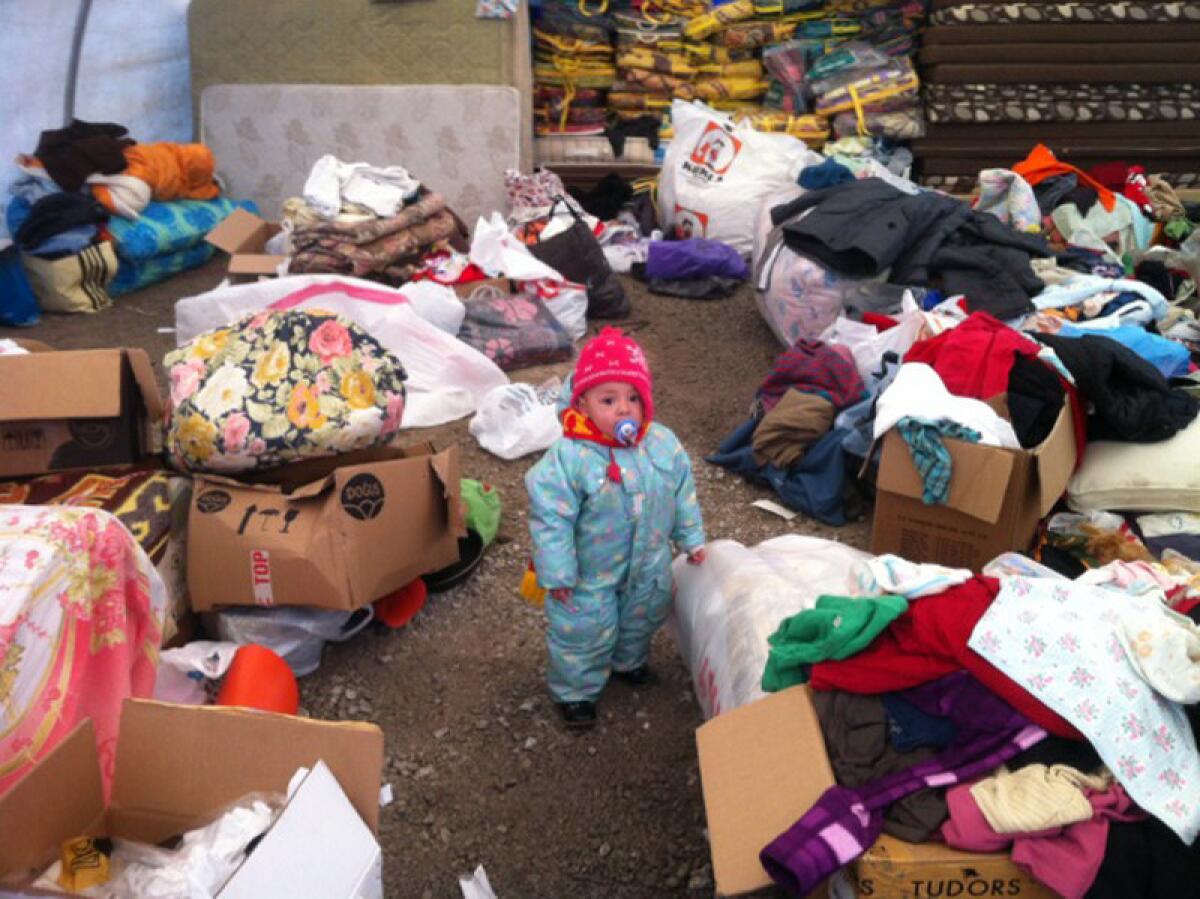Turkey embraces Muslim Uighurs who made perilous escape from China

Reporting from Kayseri, Turkey — Wearing woolen hats pulled down tight against the winter chill, the newly arrived youngsters from western China scurried around the ramshackle, low-rise apartment complex chasing after soccer balls and drifting balloons. They scampered into tents brimming with donated items, making off with lollipops and teddy bears.
The children are among 600 ethnic Uighurs from China’s violence-torn Xinjiang province who have come to this central Turkish city in recent months. Embraced by sympathetic locals who regard the Muslim migrants as ethnic and religious brethren, they are viewed askance by Chinese authorities who contend the exodus is fueled by radicals who want to use Turkey as a way station to join Islamic State militants in Iraq and Syria.
These newcomers, including many full families, are part of a growing tide of Uighurs making risky attempts to leave China as authorities step up efforts to stamp out separatism and Islamic extremism in Xinjiang, on China’s western edge. Chinese authorities have made mass arrests, banned certain kinds of head coverings, and forbidden minors to enter mosques, but bombings and stabbings have persisted. Some say the crackdown is fueling more discontent and bloodshed.
Since early 2014, hundreds of Uighurs have been arrested in Thailand for lacking valid passports; 11 were shot to death after crossing illegally into Kyrgyzstan, and at least seven have been killed in clashes with guards along the Vietnam border — including two last month.
Many of the migrants say they’re en route to Turkey, a country whose similar language and religious traditions make it easy for Uighurs to assimilate. Over the years, students, academics and other Uighurs from Xinjiang — also known as East Turkestan — have been attracted to Turkey.
Professor Erkin Emet of Ankara University, who has interviewed many of the recent migrants, estimates 7,000 arrived in 2014.
The state-run China Daily newspaper contended in a recent editorial that the migrants are “not innocent, helpless members of an ethnic minority fleeing ‘suppression’ at home in pursuit of ‘freedom.’ They are religious extremists headed to the forefronts of Islamic jihad, and devotees of the Islamic State group.”
Turkish authorities, the editorial added, are “shilly-shallying” and refusing to acknowledge the existence of Uighur extremists, making the country “a favored stopover for Uighur militants from Xinjiang on their way to terrorist camps in other countries.”
Yang Shu, a terrorism expert at China’s Lanzhou University, estimates that hundreds have joined Islamic State.
Uighur separatism is an increasingly sensitive issue for China. A spate of violent incidents involving suspects from Xinjiang culminated in March, when black-clad assailants used large knives to hack 29 people to death in a rampage in front of a train station in the Yunnan province town of Kunming.
The Uighur exodus is also delicate for Turkey, for different reasons. China is its third-largest trading partner, and flouting the concerns of Beijing could jeopardize a $24-billion annual relationship. But President Recep Tayyip Erdogan has increasingly cast himself as a defender of Muslim rights globally, and offering refuge to migrants such as the Uighurs is popular with his political base.
Uighur advocacy organizations in Turkey have begun staging small protests aimed at pressuring Ankara to do more to help Uighurs; some have even gone so far as to burn Chinese flags.
Several Uighur migrants interviewed in Turkey say they arrived on forged Turkish passports bought in Southeast Asia. But such documents may also be available in China. In January, Chinese authorities revealed that they had arrested 10 Turkish citizens in Shanghai for providing fake passports to nine Uighurs.
“China probably went public with this to send a warning to Turkey and prove a network exists,” said Jacob Zenn, a terrorism researcher with the Jamestown Foundation, a Washington-based think tank.
China, Zenn added, is facing a Catch-22 in dealing with Uighurs who want to leave. On one hand, he said, if they have become deeply radicalized, letting them leave — even if they do go to Iraq or Syria — could reduce the chance of them committing violence in China.
On the other hand, “if they go abroad, they could set up a network” that could foment anti-China extremism or carry out attacks, he said.
Emet, the Ankara University professor, said Uighurs have told him it is increasingly difficult to obtain Chinese passports. “In some places, you need 17 stamps from various offices,” he said.
Uighur families with more children than allowed under Chinese family-planning rules are unable to obtain registration documents for them, let alone passports, if they have not paid the requisite fines.
In Kayseri, a Uighur father of seven named Mohammed was sipping a piping hot glass of tea in the three-room apartment he and his family are sharing with two other families. Aside from a television, a coffee table and a few rugs covering the concrete floor, the room was bare.
Mohammed, who like many here refused to give his full name or hometown for fear of reprisals against relatives, said it took his family a year to reach Kayseri.
They decided to leave Xinjiang, he said, because they were tired of being harassed by Chinese authorities, who, he contended, targeted him simply because he was Muslim. “We need to live like humans, not like animals,” said Mohammed, 32, adding he was jailed for a month without reason and beaten. “I am a Muslim and I love the Koran. Let me live in freedom.”
He sold his business and his house and paid smugglers a total of about $37,000 to leave China. They traveled to Yunnan province, crossed into either Myanmar or Laos — he’s not sure which — and then into Thailand, finally reaching Bangkok. During the 10-day trip, they traversed mountains and lakes.
“It was a very dangerous route,” he said. “Sometimes we had to run through the night. It was very difficult.”
Nevertheless, Mohammed believes he was fortunate: He said he knows people who have spent more than three weeks getting to Thailand, and the traffickers didn’t try to beat him or extort money from him.
In Bangkok, his family survived on savings, fearful of arrest and deportation. Friends from Xinjiang soon joined them, three families sharing the apartment.
“We rarely went out,” said Abdallah, 31, one of the friends. “If [Thai police] caught us, they would send us back to China. The [Chinese] government will send us to prison for a very long time. At worst, they would execute us.”
It took about a month in Bangkok to plan the next stage of their journey, the men said. They linked up with an organized crime network from Turkey and paid about $3,500 for forged Turkish passports, which they used to travel overland to Malaysia.
Malaysia, Mohammed said, was “worse than Thailand.” “People would say: ‘Give us your wallet, give us your jewelry or we will report you,’” he recalled.
In November after 11 months in Malaysia, they boarded a plane bound for Istanbul. There, Turkish immigration authorities discovered the forged passports.
“They said, ‘You are Uighur?’” Mohammed recalled. “They confiscated them and let us come in.”
With the help of a Uighur advocacy group, they ventured to Kayseri and say they are starting to build a new life in the manufacturing hub of 850,000 people. “We want to find jobs here,” Mohammed said. “We want to contribute to this country, not rely on support.”
For now, though, new arrivals subsist primarily on handouts. An additional 400 are expected over the coming week, moving into apartments provided for free by the local government.
At a collection tent in the apartment complex, locals rolled up in trucks, unloading desks and chairs, cooking oil and tins of tomatoes. A blue Uighur flag, inset with a crescent and star, was hung between buildings, billowing beside Turkish flags.
“We are all Muslims, we have an obligation to help each other,” said 17-year-old high school student Aslahan Gedikbas, who has twice visited the apartments with supplies. “I just give them food and clothes. I love coming here.”
Times staff writer Makinen reported from Beijing and special correspondent Johnson from Kayseri. Tommy Yang of The Times’ Beijing bureau contributed to this report.
More to Read
Sign up for Essential California
The most important California stories and recommendations in your inbox every morning.
You may occasionally receive promotional content from the Los Angeles Times.











